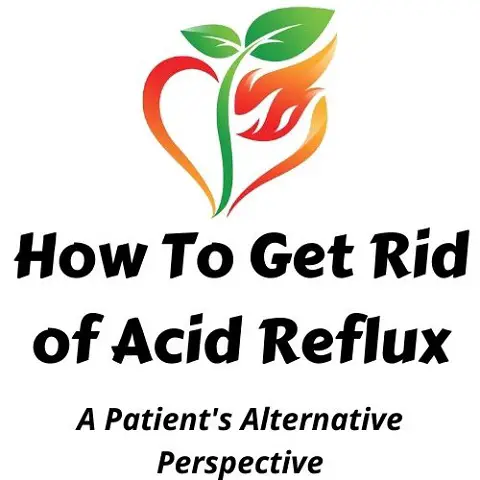Any links on this page that lead to products on Amazon and other companies may be affiliate links and we earn a commission if you make a qualifying purchase. Thanks in advance for your support!
For centuries, apple cider vinegar (ACV) has been used by cultures all over the world as not just a preservative but for its numerous health benefits as well. But, does it help with acid reflux disease, or gerd?
Apple cider vinegar has been widely reported by individuals to help ease the symptoms of acid reflux disease (gerd), but there are no conclusive science based studies which support its general use in treating gerd. In fact, in certain sufferers, it can exacerbate the symptoms and ultimate tissue damage by reflux.
However, there is evidence to show it can help with other conditions, such as obesity, diabetes and high cholesterol.
I came across it when I was researching to find out how to get rid of acid reflux, but was impressed by the overwhelming positive stories about the health benefits it seems to have. But is it as good as it seems?
Read on below to find out more about this useful addition to you pantry.
Night time reflux? Read how to avoid it here
Trouble sleeping at night because of heartburn? Find out more about night time reflux, and how to tackle it here.
How Is Apple Cider Vinegar Made?
Apple cider vinegar (ACV) is derived from fermented apple cider. The alcohol produced in the fermenting process is converted into vinegar with the addition of acetic acid forming bacteria in a second fermenting process.
It is considered that the best form of apple cider vinegar is unpasteurised, from cider apples. This should contain the “mother” – a natural substance from the pectin and apple residues, and supposedly highly nutritious.
Here’s a short video explaining how apple cider vinegar is made:
Apple Cider Vinegar For Acid Reflux & Heartburn
Commonly known as heartburn, acid reflux affects millions of people. It’s uncomfortable, it can be very painful and if left untreated, can lead to more serious complications, covered elsewhere on this site.
Apple cider vinegar (ACV) is used by some people to get relief from the pain experienced as a result of acid reflux, if only temporarily.
How does Apple Cider Vinegar Help To Relieve Acid Reflux?
The mechanism by which it achieves relief is not clear:
- one theory is that the vinegar causes an automatic reaction in the lower esophageal sphincter (LES or LOS) – the muscle between the stomach and the esophagus – which closes it, thereby not allowing acid into the food pipe (The esophagus).
- Another is that it re-balances the lack of stomach acid and allows proper digestion of food, which reduces pressure on the LES. You can read more about low stomach acid here.
- A further theory is that acetic acid – the main constituent of ACV – has a higher Ph than stomach acid, and therefore has less impact on the esophagus during a reflux episode.
- Finally, ACV has been shown (see ref 1 at the end of this article) to be as effective as the drug Fluconazole in treating candida albicans – an organism which has been linked to the overproduction of gas in the intestine, causing pressure in the stomach and pushing acid into the esophagus, thereby causing acid reflux. The ACV may help, therefore, to stop acid reflux caused by this microbe. For more on this, see Acid Reflux – Is It caused by this Bug?
Here’s gastroenterologist Lisa Ganjhu, M.D. talking about apple cider vinegar:
Does Apple Cider Vinegar Work To Ease Reflux?
There are no substantive studies demonstrating the effectiveness of apple cider vinegar for relieving acid reflux.
Nevertheless, there’s wide support for apple cider vinegar from the web. Here are some examples:

…and another:

and another…

To be honest, I’ve never had any success with ACV in helping my heartburn – the results for me have always been negative. Nevertheless, it seems to work for a lot of people. You can see more of the positive testimonials here.
Other Proven Benefits of Apple Cider Vinegar
There have been documented uses for apple cider vinegar in treating a wide range of ailments going back centuries.
However, it’s not until recently that the scientific community has taken an interest in the effectiveness of the vinegar in improving some serious medical conditions.
These have included obesity, diabetes, oral thrush and heart disease. Please note that many of the studies conducted on the effectiveness of apple cider vinegar are relatively small sample size, and some have been conducted on animals, not humans. There is a need, given the huge industry which has grown around the benefits of ACV, for large scale trials to be instigated.
Does Apple Cider Vinegar Help With Being Overweight?
Yes, apple cider vinegar appears to help with controlling and losing weight in some individuals.
Vinegar as a weight-loss aid was documented as early as the 1820s. More recently a more scientific approach has been taken to establishing whether vinegar has a positive effect on weight loss.
A study in 2010 (reference 2, at the end of this article) concluded it did. An experiment randomly split 150 overweight individuals into 3 groups to test the effectiveness of apple cider vinegar on weight loss.
Two of these groups drank 1 or 2 tablespoons of vinegar (diluted) respectively, and a third had an acid flavored drink (the placebo)
And the result? Within just one month, statistically significant drops in weight in both vinegar groups compared to placebo, with high dose doing better than low dose, which just got better month after month.
They also lost nearly an inch off their waist, which was confirmed as the loss of abdominal (visceral) fat – a great result if you, like me, could do with losing a few pounds round the middle!
Apple cider vinegar is also thought to curb the appetite through various mechanisms.
Does ACV Help With Diabetes?
Yes, apple cider vinegar has been shown to enhance the disposal of sugar by lowering insulin resistance (the cause of type 2 diabetes), and also appears to improve insulin effectiveness in diabetics.
The effect of ACV on blood sugar levels is one of the most promising of apple cider vinegar’s possible health benefits, and possibly the best researched.
Various recent studies have indicated that vinegar (including apple cider vinegar) can reduce blood glucose and therefore help to control diabetes. A review of these studies in 2017 (see Reference 3 at the end of this article) concluded that ” vinegar can be effective in reducing postprandial glucose and insulin levels, indicating it could be considered as an adjunctive tool for improving glycemic control.”
In other words, vinegar taken with a meal can help to mediate glucose and insulin levels effectively blunting the blood sugar spike after a meal by about 20 percent, thereby helping to control diabetes.
Indeed, in one study, in 2007, taking apple cider vinegar before bedtime resulted in lower blood sugars the next day. (Reference 6, below).
Be sure to consult your physician if you are taking diabetes drugs such as Metformin, as the combination may lower your blood glucose levels too much.
Does Apple Cider Vinegar Treat Oral Thrush?
Yes, apple cider vinegar has been shown to be effective in treating oral thrush (Candida) in some individuals.
Oral thrush is an inflammation of the mucous membranes of the mouth; it can also affect other soft tissues in the body. It is caused by the yeast microbe mentioned above, Candida Albicans, which is thought by some to be instrumental in the development of acid reflux, and is discussed further in this article Acid Reflux – Is It caused by this Bug?
There is also a condition called denture related stomatitis which involves mild inflammation of the oral mucous membranes in and around dentures. Denture-related stomatitis is the most common form of oral candidiasis (a yeast infection of the mouth).
There has been much written on the effectiveness of apple cider vinegar in controlling candida in some individuals. One such study, conducted in 2015, is detailed in reference 4, below, and another in 2018, reference 5, below.
Does Apple Cider Vinegar Help With Heart Disease?
ACV has been shown to improve arterial function in some individuals leading to better blood flow.
The same study mentioned above in the section on weight loss, reference 2 below, also looked at how arteries reacted to the ingestion of modest amounts of vinegar.
It found that vinegar enhances arterial function by allowing our arteries to better dilate naturally and improve blood flow.
Are There Any Problems With Taking Apple Cider Vinegar?
ACV is not for everybody. You may have certain conditions which taking vinegar may exacerbate, or if you take too much, or you drink it undiluted, you may develop problems which can be brought on by the additional acid in your body – if you are at all concerned discuss it with your physician. Generally, however, moderate amounts of apple cider vinegar are considered safe to drink for most individuals.
If you do try it for acid reflux or gerd, do so cautiously, and dilute it sufficiently. If your esophagus is irritated as a result of the reflux of acid, ingesting more acid may make it worse.
ACV May Make Heartburn Worse
There is a body of opinion which suggests that the symptoms of reflux are caused by pepsin escaping from the stomach, which is then activated by acid – from both the stomach and the food we eat and drink. Activated pepsin in the unprotected tissues of the esophagus or foodpipe is what causes the inflammation and pain we suffer.
Therefore drinking acid in the form of vinegar will only serve to activate the pepsin and worsen the symptoms.
Does Apple Cider Vinegar Burn?
Just the corrosive effect of the acetic acid in vinegar could have a severe effect on the throat tissues if it is taken without sufficient dilution.
In 2002 it was reported that a woman drank one tablespoon of white vinegar (undiluted) in order to ‘soften’ crab shell stuck in her throat. As a result she suffered inflammation of the oropharynx and second-degree caustic injury of the esophagus. This case report confirmed that vinegar could cause ulcerative injury to the oropharynx and oesophagus.
Can I Get Too Much Apple Cider Vinegar?
Overdosing on acv has been documented as causing a variety of serious side effects. For example, in a study in 1998 the conditions Hypokalemia (low potassium levels), hyperreninemia (elevated levels of an enzyme which regulates blood pressure) and osteoporosis (bone thinning) were identified in a patient ingesting large amounts of cider vinegar (Reference 7, below).
Can I Take ACV If I Have Gastroparesis?
You should be cautious about taking any vinegar if you suffer from Gastroparesis, also called delayed gastric emptying, which is a disorder that slows or stops the movement of food from your stomach to your small intestine. (see reference 8 below)
This is because vinegar in some consumers has been shown in one study to delay stomach emptying even further. (See reference 9 below).
Diabetes is the most common known cause of gastroparesis. Symptoms of gastroparesis include heartburn, and bloating. Guidelines For Taking Apple Cider Vinegar
Guidelines For Taking Apple Cider Vinegar
Here are some guidelines if you do decide to take ACV:
- Never take it undiluted, as it could burn you!
- It may interfere with some medications, such as diuretics, heart disease medications, and diabetes drugs. Consult your doctor if you are in any doubt.
- Drink diluted ACV through a straw (to minimise contact with the teeth, as it can soften the enamel a little) and avoid brushing your teeth for 1/2 hour after drinking)
- If you feel uncomfortable burning at any stage, stop using it
- Never go over the daily recommended dose (see below)
Can I Get Apple Cider Vinegar In Tablet Form?
Apple cider vinegar can also be obtained in pill, capsule or gummy forms. The tablets are formed from dehydrated acetic acid, and can contain other ingredients, such as ginger.
This may be a more palatable form of the vinegar. However, there is no evidence that tablets are effective for any of the claimed benefits of apple cider vinegar.
Indeed, there is some doubt that the tablets contain the active ingredients. A study in 2005 (see Reference 10 at the end of this article) examined eight apple cider vinegar tablet products. They were tested for pH, component acid content, and microbial growth. Considerable variability was found between the brands in pH, component acid content, and label claims. Doubt remains as to whether apple cider vinegar was in fact an ingredient in the evaluated products. The report of the study said “inconsistency and inaccuracy in labeling, recommended dosages, and unsubstantiated health claims make it easy to question the quality of the products.”
However, the tablets are very popular (possibly because they are more convenient than the liquid) among shoppers on Amazon, and the products have generally achieved high ratings. (To see a selection of the reviews, click here). Arguably the pills could have a placebo effect, but hey, if it works, don’t knock it!
One reviewer mentioned that the ACV liquid made his heartburn worse, but tablets actually made it better.
If you do decide to give the tablet form a go, be aware of a report of an apple cider vinegar tablet which caused burns after becoming lodged in a woman’s throat.
How Do I Take Apple Cider Vinegar?
How Much Apple Cider Vinegar Should I Take?
The general advice is to take 2 tablespoons of apple cider vinegar in a large glass of water, mixed, if you prefer, with honey or molasses, once a day. This dosage appears to be the one which is most effective in research into the vinegar.
When Should I Take Apple Cider Vinegar?
According to research, the best time to take ACV is just before, or with a meal, in the evening. That timing maximises the benefit of the positive effects of the vinegar on blood sugar levels, and artery function.

Leave a Reply